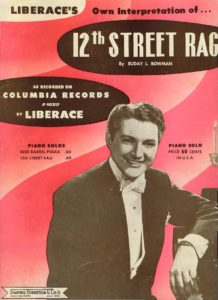Come join us now, and enjoy playing your beloved music and browse through great scores of every level and styles!
Can’t find the songbook you’re looking for? Please, email us at: sheetmusiclibrarypdf@gmail.com We’d like to help you!
12th Street Rag by Euday Bowman (Piano Solo sheet music, Noten, partition, partitura, spartito)

Best Sheet Music download from our Library.
12th Street Rag by Euday Bowman
“Twelfth Street Rag” was composed by Euday L. Bowman in 1897. Bowman was born in Fort Worth, Texas, but had run away to Kansas City at age 11. A friend of Bowman’s known only as “Raggedy Ed” declared his intention to open a pawn shop on 12th Street while the two were walking along it. Bowman is rumored to have said “If you get rich on those three balls, I’ll write a piece on three notes to make myself rich”.
The result was “The 12th Street Rag”, one of the most famous and best-selling rags of the ragtime era. It was more than 15 years before Bowman actually wrote the music down in manuscript form. He returned to Texas briefly and tried to sell the song to a company in Dallas, but only had an offer of ten dollars for it and was told it really wasn’t worth publishing. Returning to Kansas City, he sold it to Jenkins Music Company in 1913.
The Jenkins company felt Bowman’s arrangement was too difficult and hired C. E. Wheeler to simplify it. With a big advertising push, “12th Street Rag” began to sell better. In 1919, James S. Sumner added lyrics. It was popular with the early Kansas City bands and became a huge hit after Bennie Moten recorded it for Victor in 1927. It has since become an enduring standard of jazz.
The recording by Pee Wee Hunt was the Billboard number-one single for 1948, selling over three million copies. It was released as Capitol Records 15105 in May 1948.
Euday Bowman, the composer, recorded and published his own recording of the song, on Bowman 11748.
Donald Peers recorded the song in London on March 26, 1949. It was released by EMI on the His Master’s Voice label as catalog number B 9763.
Its structure is: Intro A A1 Intro-2 A2
It has been best known as the theme to The Joe Franklin Show; the version most associated with the program was Big Tiny Little’s 1959 recording from his album Honky Tonk Piano (Brunswick BL 54049).
In the 1919 short “A Day’s Pleasure” by Charlie Chaplin, the African American band is heard playing a version of the popular rag while on the ship.
More recently, the ukulele version has been featured as background music on the TV series SpongeBob SquarePants.
Euday L. Bowman
Euday Louis Bowman (November 9, 1886 – May 26, 1949) was an American pianist and composer of ragtime and blues who represented the style of Texas Ragtime. He is chiefly remembered as the composer of the highly popular “Twelfth Street Rag”, a ragtime composition from 1914 out of a series of rags that Bowman wrote during or after a period in which he worked as a pianist in bordellos of Kansas City. These pieces, including “Sixth Street Rag”, “Tenth Street Rag”, “Eleventh Street Rag” and “Twelfth Street Rag,” were named after streets of Fort Worth’s red-light district.
Please, subscribe to our Library.
If you are already a subscriber, please, check our NEW SCORES’ page every month for new sheet music. THANK YOU!
Euday Bowman was the paternal descendant of an early 18th-century German immigrant named Baumann. Three of Bowman’s relatives fought in the American Revolution, including two cousins and one direct ancestor.
Though several books list Bowman’s birth year according to a tradition as 1887, official records show his birthdate as November 9, 1886. He was born and lived in what was then a village in Tarrant County, TX. The area, originally named Bowman Springs (according to some sources Bowman Spring) after his grandfather, Isaac Gatewood Bowman (1820-1907), was renamed Webb around 1895. The origin of the Webb name is unknown. It is now a suburb in the southeast area of Arlington. Bowman’s parents divorced when he was young, and his mother moved the family to Fort Worth. Both his mother and sister were piano teachers.
A contemporary of Bowman, the ragtime pianist and composer Brun Campbell, published erroneous remarks about Bowman that were subsequently spread in other published narratives. Contrary to Campbell’s claims, Bowman did not lose a leg and did not die without heirs. In fact, when Brun wrote that, 24 claimants were involved in a lawsuit establishing the legitimate heirs.
Although many sources indicate Bowman lost a leg when he tried to hop a train, that event happened to his cousin and resulted in a lawsuit ultimately decided by the Texas Supreme Court.
In his teens and early twenties, Bowman traveled around as a pianist, and was also an arranger for popular orchestras. He lived together with his sister, Miss Mary M. Bowman, who wrote a part of Twelfth Street Rag. Bowman sold the copyright to the song for just $100.
Many years later he regained the copyright, having lost out on the royalties earned by the publisher through the many successful interpretations of that rag by artists like Louis Armstrong (1927), Bennie Moten (1927), Duke Ellington (1931), and Pee Wee Hunt (1948). Other works of his include Petticoat Lane Rag, Colorado Blues, Kansas City Blues, Fort Worth Blues, Tipperary Blues, Shamrock Rag, White Lily Dreams, and Old Glory On Its Way.
